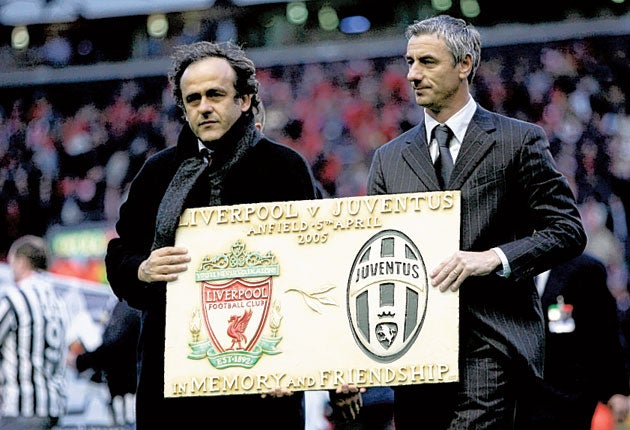Platini: Tragedies such as Heysel changed football for the better

It is 25 years since Michel Platini scored the winning goal, a penalty, in the European Cup final. And yet the memory is a deeply unhappy one, for the goal was for Juventus against Liverpool, and the stadium was Heysel, where prior to the match 39 Juve fans had died.
"It is still in my mind," he tells me. "People came to see me play, and never got home. One newspaper [the French paper Liberation] wrote that by celebrating the goal, I was dancing on the bellies of the dead. But at that time we didn't know about the dead. Only the Uefa president, the police, and the referee were aware. Yet some of our fans had knives, even pistols with them. There was no frisking in those days. If they had known that others had died, it would have been a bigger disaster."
The very word Heysel has a mixture of meanings for him, he adds. "It's complicated. You don't play the European Cup final to receive the trophy in the dressing-room, like a gangster. But those tragedies, Heysel, Sheffield, changed football for the better. People are protected now. And your country, England, has done a very good job with this."
Platini is not infrequently perceived as anti-English. He denies this strenuously. "I have no problem with English football. And I have a great love for British fans. I love your fans. They're the best fans in world. But it's true that sometimes I don't understand the Premier League, or the FA. An independent chairman of the FA, what does that mean? It's better to have a football man, no? And I don't understand why there's no rule to stop foreign owners. That's not my feeling as president of Uefa, that's a personal view. In Germany, over 50 per cent of a club must be owned by a German. That seems a good philosophy. But it's a strange world. An English club can have no English owner, no English coach, not many English players. Only the fans stay the same. The fans are always the fans. And the atmosphere they create in England is beautiful. I love it."
Platini did not play much in England himself, but he remembers his inaugural visit vividly. "I was 20, playing for the French military against the British military, at an army barracks. We went by boat from Calais, and we were told that to stop being sick, we should eat. So we ate and ate. We were all so bloated. And then we played football, in the dark, in the rain. They killed us. We lost 4-1." A huge laugh. "But later I played well in England. At Aston Villa, in Manchester. In memory of Jeanne d'Arc, you see."
We are talking a couple of days before his compatriots gave mine such a runaround at Wembley, but I ask him what his feelings are about England employing a foreign coach? Is that too an indication of a strange world? "Ah, but you have a good foreign coach. And sometimes you need a foreign coach when you're in crisis. In 1969, France lost 5-0 to England at Wembley. After that Stefan Kovacs, a Romanian, became coach, the only foreign coach France have ever had. At the time it quietened everyone down. It was the same with Fabio Capello. But after him they must go back to an Englishman."
Whoever takes charge of the England team, what wouldn't he give for a player like Platini? Maybe only Diego Maradona has been as instrumental in a team winning an international tournament as Platini was when France won the 1984 European Championships; he scored nine goals. Fourteen years later, though, Zinedine Zidane had rather a lot to do with France winning the World Cup. Which raises the question: what did Platini feel when Zizou was sent off after headbutting Marco Materazzi in the 2006 World Cup final?
There is a long silence, followed by some Gallic noises that no combination of letters can quite convey. "That's a very bad question," he says, finally. "When he left the field I was the only one who stood up and applauded. Why, because it was the last match of his career, and his career was great. Then I went to see him in the dressing room." Here, Platini squeezes his colleague William Gaillard's arm. "I just did that and went away. Nothing else. I didn't accept what he did. He set a very bad example for children. You have to have self-control on the pitch." A heavy sigh. "But it was a great career."
Subscribe to Independent Premium to bookmark this article
Want to bookmark your favourite articles and stories to read or reference later? Start your Independent Premium subscription today.

Join our commenting forum
Join thought-provoking conversations, follow other Independent readers and see their replies